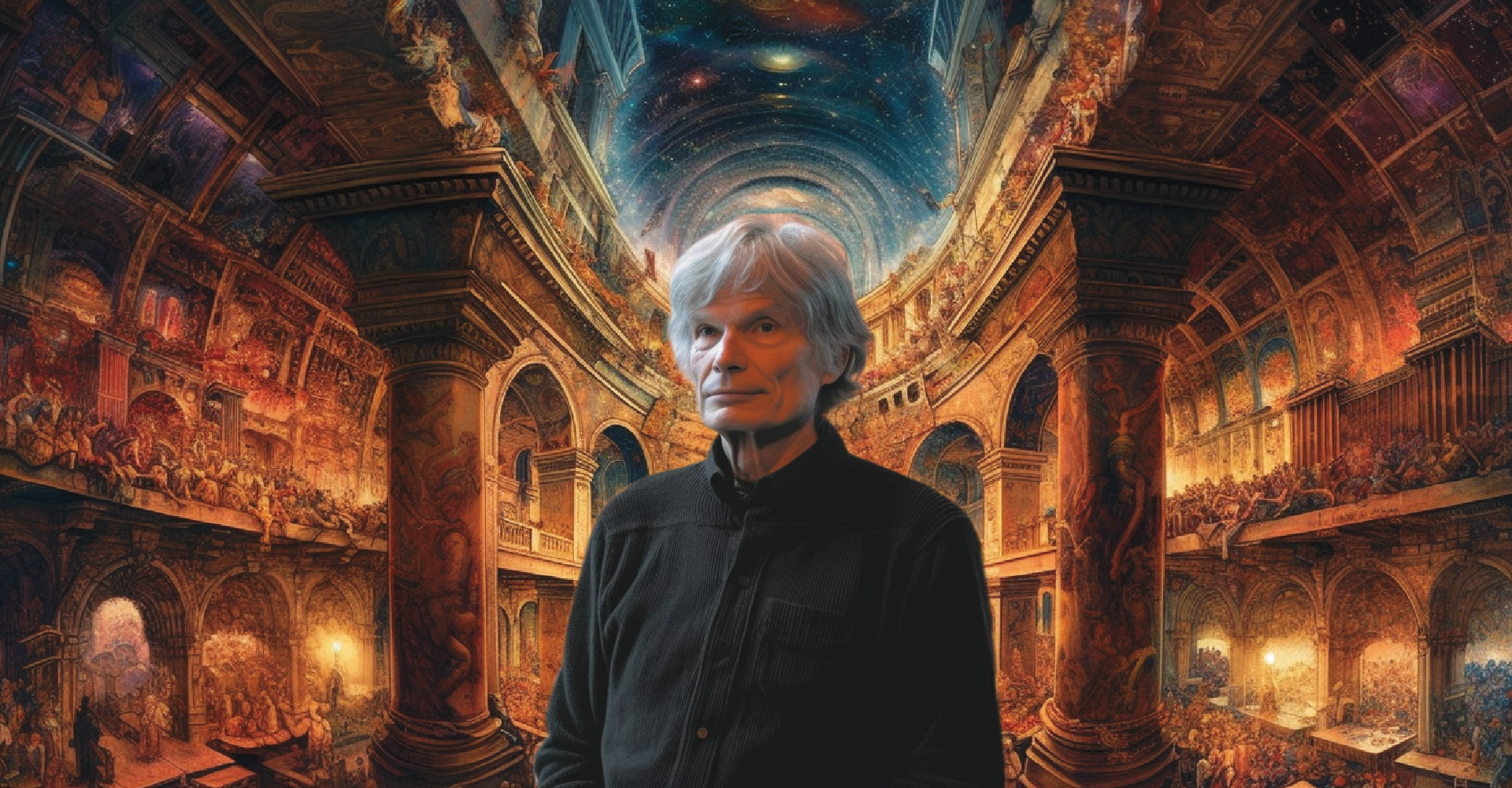The successes of mechanistic science in the 17th and 18th centuries are believed to have led to the depreciation of classical philosophy, particularly the Thomistic interpretation of Aristotle. This mechanistic science embraced the chaotic materialism of the atomists, adding to it the ideal mathematization cherished by Pythagoras and Plato.
The telos, the ultimate purpose of things and beings, was removed from scientific analysis. The telos is what something naturally tends toward; the attractor that draws it through the state-configurations of matter-energy towards its final state. It is also, more prosaically, its useful end. A watch tells the time; that’s one of its teloi. The walnut contains within it the walnut tree. The walnut tree stretches its branches towards the nourishing rays of the sun to fulfill its purpose, the walnut.
Understanding the living without using the concept of telos is extremely challenging. The walnut contains within it the walnut tree. Mechanistic science could only understand the most predictable and superficial aspects of life. Galileo himself had to deliberately disregard the conscious observer (and its possible effects on the measured phenomenon) when he founded modern physics. Thus, instead of seeing in the interactions of elementary particles a vast choreography leading somewhere, mechanistic science saw a mosh-pit of deterministic collisions and counter-collisions, but intrinsically devoid of meaning.
With telos dismissed and the purpose of things denied, the intelligibility of ‘why’ sank into oblivion. For many reasons, some valid, the essence and telos of man were questioned. As they lost sight of man’s end, political philosophers turned exclusively to his origins to organize society and establish a new natural law. These great men, Machiavelli, Hobbes, and Locke were also keen to actualize man’s power in this world, rather than wait for the coming of the City of God. While the ancients took their bearings with eyes fixed on the stars, the moderns deliberately chose to gaze at the horizon. This endeavor culminated in the belief that the nature of man is infinitely perfectible.
However, recent decades have seen a renewed interest in the concept of teleology in the life sciences. Far be it from me to deceive the reader and make them believe that teleology is accepted by the majority of biologists, or even a significant minority. No, this interest represents only the beginnings of a rediscovery that may not be fruitless or insignificant for political philosophy. Nonetheless, one must avoid falling into first-level teleological thinking that obscures, distorts, or simply denies the process of Darwinian evolution through random mutations and natural selection. It is also essential to free oneself from the falsehood that if a process is teleological, it is necessarily predetermined and entirely predictable. The algorithm is not the result.
Intentionality and progressive complexity: we will touch on only two aspects of contemporary scientific exploration of teleology, then we will evaluate how this teleology could become philosophically normative.
Living systems act with intention: a bacterium activates its internal molecular machinery to mobilize its cilium, allowing it to move up a glucose gradient. At this level, one might presume that all action is instinctive; animated but unreflective. This would overlook and underestimate the number of intracellular computations required for the functioning of the most basic prokaryote. If consciousness and intention are merely the result of sheer computational power – as proponents of general and conscious artificial intelligence like to remind us – then it is hard not to see in the quantity exhibited by our prokaryote cousins a special quality. But let’s move on and overlook the unicellular organisms. Consider one of the hormones found in a mammal – whether it’s thyroxine, cortisol, or testosterone. Hormones are intra-system communication tools. Some of their effects are intrinsic and explained by their molecular conformation, but others require interpretation by the rest of the system. A message, even if hormonal or molecular, implies both an author and an interpreter. A hormone is secreted in response to a change in the environment, which remotely triggers, and after being interpreted as a relevant signal by the cells whose behavior it was meant to alter, the necessary changes to maintain the organism’s homeostasis. The proximal purpose of the hormone is to initiate a series of precise physiological changes. The ultimate goal, the teleological goal, is the system’s homeostasis. This communication system is shaped by Darwinian evolution because it provides the organism with a reproductive advantage in a given environment. Intentionality, purpose, is what is selected by Darwinian evolution. Without homeostasis, there’s no reproduction. Without an intrinsic purpose to the system, there’s no selection.
Although still marginal, some biologists argue today that teleological reasoning is the only one that can allow them to understand the reason for a molecular system within a living context. These molecular modules collaborate to maintain the homeostasis of a whole (the living being) without which they would not only be without reason, but they wouldn’t exist at all. The chain of causality is not simply ascending, from the part to the whole. The role of the part is based on its position within the whole and the relationships it maintains with the other parts making up the entire system. Biologists who refuse a priori to recognize the existence of a process governing these ascending and descending interactions, an intentionality, often refer to “emergent” properties. Unfortunately, this magical emergence often resembles the ether of science from past ages. We are given a word, as one gives a bone stripped of meat to a dog. Nothing explains exactly what this emergence entails, what it brings into the world, its ontological status, and its relationship with energy-matter. The boldest connect it precisely with the concept of information. And here we are again; what is information if not an intention to communicate? And what is intention if it has no end, no telos? One can speak of teleology as soon as a given system acts with purpose, as soon as it becomes agentic. If an agent anticipates a goal before undertaking an action, or if a system has a mechanism to maintain homeostasis despite environmental fluctuations, it is hard not to speak of teleology. Here, it’s a bounded teleology, limited to the living system and its relations with its environment.
Intentionality is intrinsic to the system, but also transcends it. This limited teleology is not the only one that should draw our attention. There exists another one, so to speak, more remote, more obscure, but in some respects easier to grasp: a meta-teleology of universal complexification. The very emergence of molecular or macroscopic modules (like the visual or auditory apparatus, for example) is more easily explained when we don’t limit ourselves to the traditional markers of Darwinian evolution, which are simple random mutations filtered through natural selection. Too often, the focus is only on the random mutations of this process, neglecting the importance of the physicochemical constraints that make it even possible. These constraints prohibit or authorize various forms of life and make phenotypes converge towards a range of functionalities. These constraints are determined by the fundamental laws of our universe (ranging from the gravitational constant to the mass of an electron), without which it seems clear that no complex structure (and possibly no atom) could exist. The precise numerical values of these constants play a precise chord allowing matter to emerge and become more complex. This complexification happens despite the incessant onslaughts of the tide of entropy trying to submerge any dissipative structure far from thermodynamic equilibrium. We have been told ad infinitum that nothing could ever break the Second Law of Thermodynamics. And yet, while recognizing our biotechnological planetary civilization is an open system bathed in divine sunlight, every sunrise that sees it still standing makes a mockery to this universal law.
But this civilization is the fruit of the Cosmos, like everything else. Despite the homogenization of the Second Law, pockets of complexity flourish. Recognizing the second teleology, cosmic metateleology, is to recognize that the universe is autopoietic and self-complexifying. This meta-telos seems inherent to the structure of our universe. It could be seen as an unchanging movement. The universe is fundamentally creative and projects into existence complex dynamic systems themselves capable of maintaining themselves far from thermodynamic equilibrium, endlessly sampling possibility space There is no Omega point, no temporal end to this complexifying expansion. There’s only a boundary to push further.
The first teleology discussed here is the intentionality manifesting in the behavior of biological systems. This weak teleology is bounded rather than fundamental. It is localized or remains the property of a given biological system (potentially at several levels of analysis: molecular, cellular, individual, ecological). The metatelos refers to universal complexification itself. To speak like an Ancient, this natural law is outside of cosmic becoming, but actualized within it. As the terrestrial biotechnological life that stems from it includes the most complex structures known in the Universe, this means that life is the result of the metatelos. The ultimate destination is unknown – all the new functions/forms of life that will emerge are unknown, but the direction is there. We can still navigate by the stars, knowing that the horizon will always elude our sight.
How is all of the above relevant for the political philosopher? First, you must concede to me that the Stoic sages were right: what is natural is just; nature is normative. Value judgments are inseparable from facts. The paralogism suggesting that nature does not determine the Good has blinded us long enough. The natural is not just what occurs in the world, but what conforms to the natural order. But, to concede this point, that conformity to the natural order is just, isn’t it to concede a priori that the telos should be normative? Not necessarily, because it is not said that either the metatelos or the limited telos exist. Nature could exist and only be chaos. Conformity to an irregular, chaotic, and destructive order would be harmful to human society. It would then be totally justified to become the masters and possessors of Nature. Human conventions should take precedence over the natural order. But if, as our ancestors believed, there exists something like a natural order, generally beneficial; and if this order tends to perpetuate itself, expand, and become more complex, the homology between the natural order and men’s social creations reveals itself as the right path to follow. To the incredulous, I offer a more empirical than deductive argument. I propose that a group devoted to the pursuit of the universal natural order, and motivated by the unproven conviction that this intelligible order is accessible to human understanding (either by reason, revelation, madness, instinct, or iterations selected by Darwinian evolution), will outperform a nihilistic group disconnected from biology. The results of this natural experiment are everywhere around us. On one hand, there are those who try, as best they can, to live in accordance with the rank and role that nature has assigned to them at birth, and on the other hand, there are the bewitched ones of rebellious will who deny both their own flesh and soul.
Thus, the question of the nature of man can be reopened. It is not only man’s origin, the state of nature, which can be invoked to justify a political vision of the world, but also his purpose. Man is part of the world; he is subject to its laws and cannot escape them. As man is a biological system, and teleology is characteristic of biological systems, it is entirely appropriate to ask: What is man’s limited purpose? Not asking this question is to misunderstand the nature of the human animal. Building a political system without natural foundations is doomed to fail. Our era is so engulfed in the delusion of the tabula rasa and the perfect perfectibility of man that simply recognizing that the search for a natural end for man is legitimate becomes a victory in itself. The existence of this limited purpose preserves man from being swallowed up in a Whole that surpasses him. A Whole which risks suffocating him if we rely only on the metatelos to structure society. Here, I will only venture to propose a hypothesis which, if it garners little general assent today, has the support of our ancestors and past centuries. The limited purpose of man is the realization of the excellences inherent in his biological nature. As a man, it must be repeated, this nature is limited to the fleshly ruts of his biology. As an open and, to some extent, perfectible system, man also gropesfeels his way towards a goal that surpasses him but is his own. The democratization of Nietzsche’s injunction to become the author of one’s values has done much harm, not because it is necessarily harmful, but because it has been divorced from the understanding of the bio-physico-psychological markers of these values. “One is worth a thousand if he is the best,” Heraclitus teaches us; the best starts by knowing oneself.
A more in-depth exploration of man’s limited purpose is necessary but will not be undertaken here. Man, as part of the Whole, will have a purpose that is only understandable in relation to the Whole. The part only derives its ultimate meaning from its relations with its whole. But here’s the problem: man is incapable of understanding the Whole, the entire Cosmos. The ancients knew this and were only momentarily troubled by this fact. The desire for completion that drives man out of himself, which motivates the warrior’s recklessness and the sage’s ascent out of the cave, will never be fully satisfied.
Understanding that there exists a metatelos – a general direction of universal complexification and expansion of the realm of the possible – allows one to relate man to the cosmic Whole. Among all beings on this Earth, which one is most capable of acting to preserve and expand the realm of life? Man. Which one not only possesses the instinctive will to propagate, but also the reason to optimize the way forward? Man. Which one can, not only act, but act consciously, intentionally serving as a bridge for the expansion of the biological domain in the cosmos? Man. This is the affirmation of natural life. Man as the shepherd of life. Human expansion beyond the confines of this Earth is the natural and just result of the forces of nature. Limiting or slowing down this expansion on the pretext that the sums invested could be deployed for “humanitarian” purposes is immoral because it goes against nature. Can the metatelos, universal complexification, be normative? Yes. From this normativity stems the importance of studying the conditions for its realization.
In broad terms, these conditions include: the stable transmission of life, the homeostasis of the terrestrial ecosystem, and the diversification of planetary ecosystems. These conditions form the foundation of an archaeprogressive ecological program. This program is based on technological development: the very survival of the biosphere is guaranteed by nothing. We are just a volcanic eruption or asteroid impact away from the collapse of human biotechnological society, and thereby the annihilation of the possibility of expanding the biosphere. The realization of the metatelos relies on the Faustian pact of the West. The metatelos and the limited telos complement each other. The eternal expansion into infinite space is the calling of our Western civilization, while the pursuit of the limited perfection of a unique embodied being was that of our Greco-Roman ancestors.
As the paradigm shift in philosophical and scientific thinking at the beginning of the modern era had an impact on the political philosophy of that time, a questioning of mechanistic science and a return of teleology in science will have an impact on today’s political philosophy. Mechanistic science made man Nature’s possessive master. Teleological science might restore him to his rightful place as both her emulator, and shepherd.




